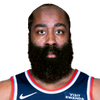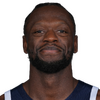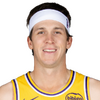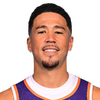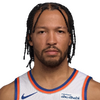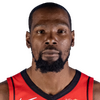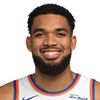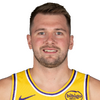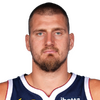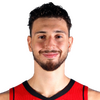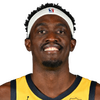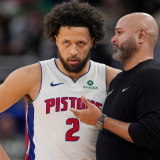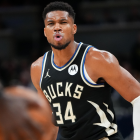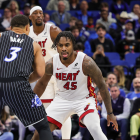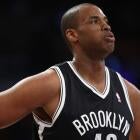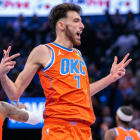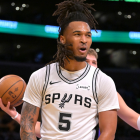Way-too-early NBA All-Star picks: 24 players who should suit up in U.S. vs. World round-robin format
The changes to the annual showcase feature 24 players -- 16 Americans and eight internationals -- in a round-robin tournament.
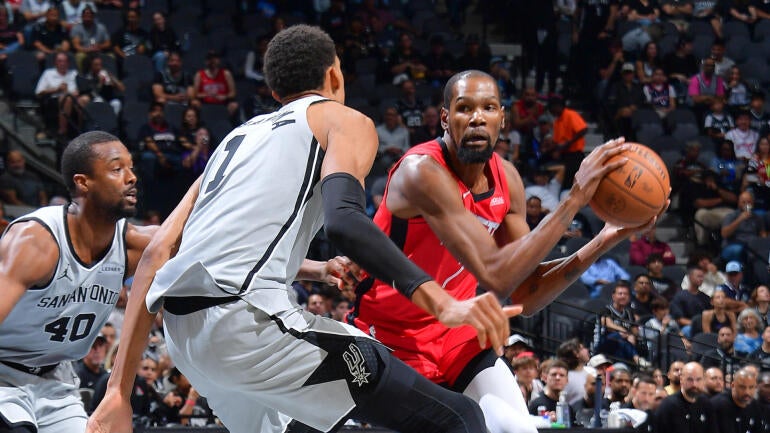
Late on Tuesday night, the NBA officially announced the brand new U.S. vs. World format for the 2026 All-Star Game. This edition of the annual showcase will feature a round-robin tournament between three teams -- two made up entirely of Americans and one made up of international players.
Each team will have at least eight players and the games will last 12 minutes. Here's how the tournament will work. Via the NBA:
"In the round-robin tournament, Team A will play Team B in Game 1. The winning team from Game 1 will take on Team C in Game 2, followed by the losing team of Game 1 meeting Team C in Game 3.
"After Game 3, the top two teams by record will advance to face each other in the championship game (Game 4). If all three teams have a 1-1 record after Game 3, the tiebreaker would be point differential in each team's two round-robin games."
Your next question will likely be about how the All-Stars will be selected given this unique format. Again, let's turn to the league and let them explain:
"As in the past, 24 NBA All-Stars (12 from each conference) will be selected as follows: The five players honored as starters from each conference will be selected by fans (50% of the vote), current NBA players (25%) and a media panel (25%), and the seven players honored as reserves from each conference will be selected by NBA head coaches. This year, the All-Stars will be selected without regard to position. The process for assigning players to the two U.S. teams will be determined at a later date.
"If NBA All-Star voting does not result in the selection of 16 U.S. players and eight international players (which can include American players with ties to other countries if necessary), then NBA Commissioner Adam Silver will select additional All-Stars to join either group to reach that minimum. In that case, at least one team would have more than eight players."
The league has not yet announced when All-Star voting will begin, but it will likely be at some point in mid-December. (Last year, it began on Dec. 19.) That's not for another month, and by then we'll have a much bigger sample size to determine which players deserve a spot.
In the meantime, now that the official format has been announced, let's see which players are on the right path. It will be fun to look back in a few months once the All-Star teams are announced and see how many of these players end up earning a trip to Los Angeles for the Feb. 13-15 weekend.
In keeping with the rules, I have selected 12 players from each conference -- a total of 16 Americans and eight international players. It's still unclear how the American teams will be separated, but it would make sense to balance them positionally, so that's what I tried to do. I did not put much thought into separating the teams beyond that, however. Likewise, I did not notate starters since it's unclear how those spots will be determined. (Ten players will be honored as starters via fan voting, but those 10 players won't necessarily be split evenly between U.S. and international players. Plus, 15 players will have to start for the three teams.)
OK, enough rambling. Let's get to the early All-Star picks.
Team U.S. 1
We'll start with the guards here on Team U.S. 1. Tyrese Maxey (32.1), Donovan Mitchell (30.4) and Austin Reaves (30.3) have been unbelievable and are all averaging over 30 points per game. There's really not much more that needs to be said. They have to be on the list right now. James Harden
Now on to the lone true wing on this squad. Jaylen Brown isn't at the 30-point-per-game threshold, but he's not far off it at 27.7 points per game. He's having the most efficient season of his career (60.6% TS) and doing everything for the shorthanded Celtics.
And, finally, the bigs. Jalen Duren is in the midst of a breakout season for the Pistons, who are in first place in the East. He's averaging a double-double (19.4 points and 12 rebounds) on 64.7% shooting. Julius Randle helped keep the Timberwolves afloat when Anthony Edwards was sidelined, and is averaging a career-highs in points (25.4) and assists (6.2) per game. Evan Mobley made his first All-Star Game last season in a breakout campaign, and looks likely to return. He's also putting up career-best numbers in points (20.1), assists (4.3) and steals (1.5) per game.
Team U.S. 2
Now for Team U.S. 2. Again, let's begin with the guards. The Suns are off to a surprising 6-5 start thanks largely to Devin Booker, who has been terrific. He's not only scoring at an efficient rate (28.4 points per game on 50.7% shooting), but leading the team in assists (6.8) as well. Jalen Brunson is putting up almost identical numbers (27.7 points and 6.6 assists per game) to his last two All-Star seasons, and the Knicks go as he goes. Cade Cunningham just authored one of the most bizarre triple-doubles ever, and has been awesome for the first-place Pistons. His 27.5 points and 9.9 assists per game are both career-highs. Steph Curry's overall numbers have taken a dip this season, but he's still putting up 25 points a night and leading the Warriors in scoring.
Let's move on to the wings/forwards. This has been a strange first few weeks for the Magic, but Paolo Banchero is doing his part. He's leading the team in points (23.3) and rebounds (9.1) and is third in assists (4.3). Jimmy Butler is never going to put up huge scoring numbers, but he's been an efficient all-around force for the Warriors and is ninth in the league in win shares (1.6). Kevin Durant, meanwhile, has taken to life in Houston. His numbers have taken a bit of a dip in a slightly lesser role, but he's been extremely efficient when the Rockets need him to bail them out. He's shooting 71.4% in clutch minutes -- score within five with five minutes or less remaining -- and 55.6% with four seconds or fewer remaining on the shot clock.
And, finally, for the lone true big on this team. Karl-Anthony Towns has been up-and-down as he adjusts to life in new coach Mike Brown's offense, but despite not being super efficient, he's still putting up a double-double (20.7 points and 12.7 rebounds per game).
Team World
An American player hasn't won MVP since 2018, and it doesn't appear that will change this season. The top-five favorites for MVP right now (per Caesars) are Shai Gilgeous-Alexander (+210), Luka Dončić (+325), Nikola Jokić (+350), Giannis Antetokounmpo (+550) and Victor Wembanyama (+600).
That quintet will assuredly be in the All-Star Game barring any injuries, and there's really no need to go into details. Gilgeous-Alexander has the Thunder off to an 11-1 start; Dončić is putting up 37.1 points, 9.4 rebounds and 9.1 assists a night; Jokić is once again averaging a triple-double; Antetokounmpo's league-leading 23.4 points in the paint per game would rank 20th in the league (he's averaging 33.4 points overall); Wembanyama is leading the league in blocks (3.9 per game) and is an elite defense unto himself.
There is some discussion to be had about the final three spots, which is a testament to the international talent in the league right now.
The Bulls have cooled off a bit lately, but it's impossible to keep Josh Giddey off the list with the way he's been playing to start the season. He's putting up career-highs across the board, and is within striking distance of averaging a triple-double (21.4 points, 9.6 rebounds and 9.3 assists.)
Alperen Sengun also deserves a nod. He was excellent at EuroBasket this summer and has carried that momentum into the start of the season. His improvement as a 3-point shooter (39.3%) and playmaker (7.3 assists per game) have been crucial to the Rockets' success (6-3).
Finally, it would be a crime to ignore what Pascal Siakam has been doing this season for the extremely shorthanded Pacers, who have already had 20 players appear in a game. Siakam has no help, but he's been plugging along en route to career-highs in scoring (24.3 points) and assists (5.8) per game.
Apologies to Deni Avdija, Lauri Markkanen, Franz Wagner and Jamal Murray, all of whom have a case.






